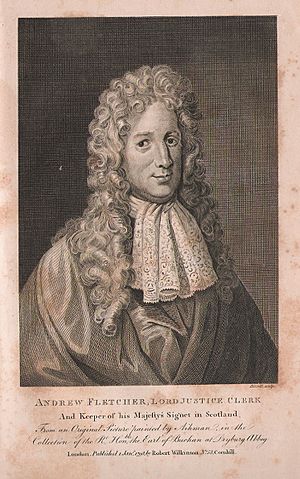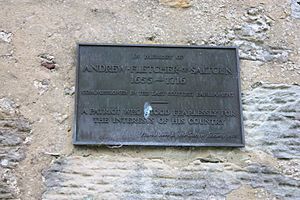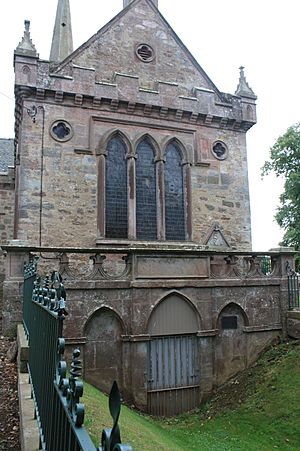Andrew Fletcher (patriot) facts for kids
Quick facts for kids
Andrew Fletcher
|
|
|---|---|

Andrew Fletcher
|
|
| Commissioner for Haddingtonshire | |
| In office 22 September 1702 – 1707 |
|
| Monarch | Queen Anne |
| Commissioner for Haddingtonshire | |
| In office 1681–1683 |
|
| Commissioner for Haddingtonshire | |
| In office 1678–1680 |
|
| Personal details | |
| Born | 1655 Saltoun, East Lothian, Kingdom of Scotland |
| Died | September 1716 (aged 61) London, Kingdom of Great Britain |
| Political party | Country Party |
| Parent | Sir Robert Fletcher |
| Military service | |
| Allegiance | Duke of Monmouth (1685) William of Orange (1688) |
| Battles/wars | Monmouth Rebellion Great Turkish War Glorious Revolution |
Andrew Fletcher of Saltoun (1655 – September 1716) was an important Scottish writer and politician. He is best known for strongly opposing the Act of Union between Scotland and England in 1707. He believed Scotland should remain an independent country.
Fletcher had to leave Scotland in 1683 after being accused of planning against the King. He later joined the Monmouth Rebellion, a fight against the King. After a difficult event during the rebellion, he had to go into exile again. He eventually returned to Scotland with William of Orange and became a Commissioner in the old Parliament of Scotland.
He also supported the Darién scheme, a Scottish plan to set up a colony in Panama. Fletcher was worried about how much power London had. He thought it would draw all the wealth and decisions away from Scotland.
Contents
Early Life and Political Beginnings
Andrew Fletcher was born in Saltoun, East Lothian. His father was Sir Robert Fletcher. A future important church leader, Gilbert Burnet, taught him when he was young. Andrew finished his education in Europe.
In 1678, Fletcher was chosen to represent Haddingtonshire in the Scottish Parliament. At that time, King Charles II's representative in Scotland, the Duke of Lauderdale, had a lot of power. He could collect taxes and keep an army. Fletcher strongly disagreed with the Duke's actions. This made Fletcher distrust the King's government and all inherited power even more.
Fletcher was re-elected to Parliament in 1681. He was part of the opposition group called the Country Party. He always spoke out against unfair actions by the Church or the government.
Exile and His Return
In 1683, Fletcher was accused of plotting against the King. He fled Scotland and went to the Netherlands. There, he joined English opponents of King Charles. He was given command of the cavalry for the Monmouth Rebellion. During the rebellion, an argument happened over a horse, which led to a tragic accident involving another leader. Because of this, Monmouth had to send Fletcher away.
After escaping from a Spanish prison, Fletcher fought in Hungary against the Turks. He then joined William of Orange and returned to Scotland in 1688. However, Fletcher soon realized that William (who became King William II in Scotland) was mainly interested in using Scotland to fight foreign wars.
Fletcher got his lands back. He became a strong defender of Scotland's interests against England's. He also continued to oppose too much royal power. In 1703, he became a member of the Scottish Parliament again. At this time, Queen Anne was on the throne. There was a big push to unite England and Scotland into one country.
The Darién Scheme and the Act of Union
Fletcher was an early supporter of the Darién scheme, a Scottish attempt to create a trading colony in Panama. This plan ended in a huge financial disaster for Scotland. This happened at a very bad time, as Scotland had also suffered from poor harvests. Fletcher continued to defend the scheme, even when others blamed it.
Many Scots felt angry and blamed England for the scheme's failure. Fletcher and the Country Party used this anger to push for Scottish independence. However, the financial ruin caused by Darién also made it harder for Scotland to resist England's plans for a Union. England even offered money to Scots who would support the Union.
Fletcher continued to argue against a full "incorporating union." He wanted a "federal union" instead, which would protect Scotland's nationhood. Even though he couldn't stop the Act of Union from passing, his strong arguments made him known as a true Scottish patriot.
One of his most famous ideas was his "twelve limitations." These were rules he wanted to put in place to limit the power of the King and English ministers in Scottish politics. For example, he wanted:
- Parliaments to be elected every year.
- Parliament to choose its own leader.
- The King to need Parliament's approval for peace and war.
- Parliament to control all government jobs and pensions.
- No permanent army without Parliament's consent.
- All able-bodied men to be armed and ready to defend the nation.
- If a King broke these rules, he would lose the crown.
Even though these specific limitations didn't pass, the Scottish Parliament did pass similar laws. The Act of Security set conditions for who could become King or Queen of Scotland after Queen Anne, especially if they were also King or Queen of England. The Act anent Peace and War said that after Queen Anne's death, no ruler of both Scotland and England could declare war without the Scottish Parliament's permission.
Leaving Politics
In 1707, the Act of Union was approved. This officially joined Scotland with England to form the Kingdom of Great Britain. Fletcher was very disappointed. He left politics and spent the rest of his life focusing on farming and improving agriculture in Scotland.
He died in London in September 1716. He never married. His last known words were, "Lord have mercy on my poor country that is so barbarously oppressed."
What People Thought of Him
Andrew Fletcher was known for having one of the best private libraries in Scotland. Historian Arthur L. Herman described him as a very smart thinker. Alasdair MacIntyre wrote that Fletcher was one of the few people who truly understood the big choices Scotland faced. Even Thomas Jefferson, a founding father of the United States, admired Fletcher's political ideas. Jefferson believed Fletcher's principles were similar to those that inspired the American colonists.
His Writings
Fletcher wrote several important books.
- A Discourse of Government relating to Militias (1698): In this book, he argued that Scotland should have local citizen armies (militias) instead of a royal army. He believed this would make citizens more involved and stronger. This book contains the famous phrase "well regulated militia," which later appeared in the Second Amendment to the United States Constitution.
- Two Discourses concerning the Affairs of Scotland (1698): Here, he discussed Scotland's trade and economic problems.
- An Account of a Conversation concerning a right regulation of Governments for the common good of Mankind (1703): In this work, he made a famous remark: "I knew a very wise man so much of Sir Christopher's sentiment, that he believed if a man were permitted to make all the ballads, he need not care who should make the laws of a nation." This means that popular songs and stories can influence people more than laws.
Family Life
In 1747, Andrew's nephew, also named Andrew Fletcher, inherited Saltoun Hall. He later bought more land nearby. Andrew's cousin, William Fletcher, moved to Ireland in the 1690s, and his family became successful there.
See Also
- List of Scottish Unionists
|
 | Georgia Louise Harris Brown |
 | Julian Abele |
 | Norma Merrick Sklarek |
 | William Sidney Pittman |



